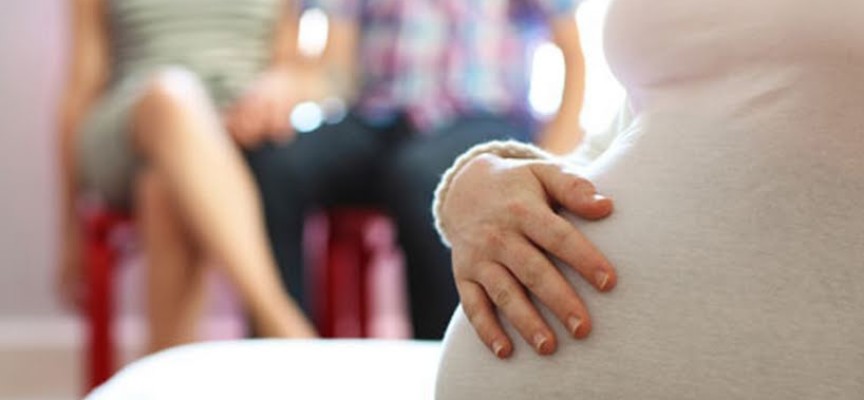Criticism against the exploitation of vulnerable women and the “exploitation for economic purposes of the child”. COMECE asks for EU legislation (wwww.comece.org).
The Commission of the Bishops’ Conferences of the European Community (COMECE) expresses in favour of rapid and uniform legal standards regarding surrogacy at European and international level, especially to prevent the further spread of commercial surrogacy. All forms of surrogacy represent a serious violation of the human dignity of those who are involved, says a recent document of the COMECE addressed to the European Parliament. It is observed that the practice of surrogacy exploits surrogate mothers from poor population groups for the benefit of wealthy couples or single wealthy people and treats children as objects. In particular, the Episcopal Commission warns against a society “in which children are made and sold as products”.
The 28-page document of the working group Comece “Ethics in research and medicine” was presented on 23rd February in Brussels at a conference organized by the European People’s Party (EPP) on “surrogacy and human dignity”. The text refers, among other things, to the boom of surrogate motherhood in countries like India, Thailand, Ukraine, Russia but also in the US state of California. In EU Member States there are different laws regarding surrogacy. At EU level there are no rules.
The group of twelve experts who prepared the document COMECE refers to “regulatory disorder” that exists in the EU countries regarding this issue. They also cite a comparative study of 2013, which shows that, for example, the United Kingdom allows a payment of 4,000-5,000 euro to surrogate mothers. As to the other Member States, today there are seven completely prohibiting surrogacy, while in six others it is permitted under specific conditions. Twelve countries do not have laws on the subject.
The COMECE document also highlights how surrogacy leads to a “child exploitation for economic purposes”. This is in contrast to “the affirmation of human dignity as the cornerstone of the Charter of Fundamental Rights of the EU, and violates the prohibition of making use of the human body and its parts for commercial purposes (Art. 3)”. “The legal issue is crucial if we want to establish a society in which children are being manufactured and sold as products, and if we are aware of the consequences (…) on the human and social relations”, say experts in bioethics. The EU must accept the “reproductive tourism” and the “market for surrogate motherhood” as an irreversible fact.
The working group Comece sees a first legal reference in the uniform application of the legal principle that a child is always legally the child of the mother who gave him birth.
The search for rules and common practices could begin from the refusal of recognition of birth certificates in cases where the surrogate is paid a fee, the statement says. “Any other attitude of the judicial or administrative authorities would only allow the commercial mechanism of surrogacy to prosper further” (Kathpress, 02/25/2015).
Critica contro lo sfruttamento di donne vulnerabili e la “strumentalizzazione per fini economici del bambino”. La COMECE chiede una legislazione europea (wwww.comece.org).
La Commissione delle Conferenze Episcopali della Comunità Europea (COMECE) si esprime in favore di rapide e uniformi norme giuridiche riguardo la maternità surrogata a livello europeo e internazionale, soprattutto per prevenire l’ulteriore diffusione a fini commerciali della maternità surrogata. Tutte le forme di maternità surrogata rappresentano una grave violazione della dignità umana di coloro che ne sono coinvolti, afferma un recente documento della COMECE indirizzato al Parlamento europeo. Vi si osserva che la pratica della maternità surrogata strumentalizza madri surrogate provenienti da gruppi di popolazione povere a beneficio di coppie o singole persone benestanti e tratta i bambini come oggetti. In particolare la Commissione episcopale mette in guardia da una società “in cui i bambini sono fabbricati e venduti come prodotti”.
Il documento di 28 pagine del gruppo di lavoro Comece “Etica nella ricerca e nella medicina” è stato presentato il 23 febbraio a Bruxelles nel corso di una conferenza organizzata dal Partito popolare europeo (PPE) sul tema “maternità surrogata e dignità umana”. Nel testo si fa riferimento tra l’altro al boom di maternità surrogate in paesi come l’India, la Thailandia, l’Ucraina, la Russia ma anche nello stato USA della California. Negli Stati membri dell’UE vi sono normative diverse riguardo la maternità surrogata. A livello UE non esistono regole comuni.
Il gruppo dei dodici esperti che ha preparato il documento COMECE fa riferimento al “disordine normativo” che vige nei paesi dell’Unione europea riguardo questo tema. Essi citano anche uno studio comparativo del 2013 da cui emerge che, per esempio, il Regno Unito consente un pagamento 4.000-5.000 euro alle madri surrogate. Quanto agli altri Stati membri, a oggi sono sette che vietano completamente la maternità surrogata, mentre in altri sei è ammessa in condizioni particolari. Sono dodici, invece, i Paesi che non hanno disposizioni di legge in materia.
Nel documento della Comece si sottolinea inoltre come la maternità surrogata porti a una “strumentalizzazione del bambino per fini economici”. Questo è in contrasto con “l’affermazione della dignità umana come pilastro portante della Carta dei diritti fondamentali dell’UE e viola il divieto di fare del corpo umano delle sue parti un uso per scopi di lucro (Art. 3)”. “La questione giuridica cruciale è se vogliamo istituire una società in cui i bambini vengono fabbricati e venduti come prodotti, e se siamo coscienti delle conseguenze (…) che ne deriveranno per le relazioni umane e sociali”, sostengono gli esperti di bioetica. L’UE deve accettare il “turismo riproduttivo” e il “mercato per la maternità surrogata” come un dato irreversibile.
Il gruppo di lavoro Comece vede un primo aggancio giuridico nell’uniforme applicazione giuridica del principio fondamentale per cui un bambino è sempre giuridicamente il figlio della madre che lo ha fatto nascere.
La ricerca di regole e pratiche comuni potrebbe iniziare dal rifiuto del riconoscimento dei certificati di nascita nei casi in cui alle madri surrogate sia stato pagato un compenso, si legge nella dichiarazione. “Qualsiasi altro atteggiamento delle autorità giudiziarie o amministrative non farebbe che permettere al meccanismo commerciale della maternità surrogata di prosperare ulteriormente” (Kathpress, 25.02.2015).
EU-Bischöfe: Leihmutterschaft ist Angriff auf die Menschenwürde
Kritik an Ausbeutung schutzbedürftiger Frauen und “Ökonomisierung des Kindes” – ComECE für europaweite gesetzliche Regelung (www.comece.org)
Die Kommission der Bischofskonferenzen der Europäischen Gemeinschaft (ComECE) spricht sich für rasche einheitliche gesetzliche Regeln zur Leihmutterschaft auf europäischer und internationaler Ebene aus, insbesondere um die weitere Ausbreitung kommerzieller Leihmutterschaften zu verhindern. Alle Formen von Leihmutterschaft stellten eine schwere Verletzung der Menschenwürde der Beteiligten dar, heißt es in einer aktuellen ComECE-Stellungnahme an das Europaparlament. Darin wird festgehalten, dass die Praxis der Leihmutterschaft, Leihmütter aus armen Bevölkerungsgruppen zu Gunsten wohlhabender Paare oder Einzelpersonen instrumentalisiere und Kinder als Objekte behandle. Konkret warnt die Bischofskommission vor einer Gesellschaft, “in der Kinder hergestellt und als Produkte verkauft werden”.
Das 28-seitige Papier der ComECE-Arbeitsgruppe “Ethik in Forschung und Medizin”, das am 23. Februar 2015 bei einer Konferenz der Europäischen Volkspartei (EVP) zum Thema “Leihmutterschaft und Menschenwürde” in Brüssel präsentiert wurde, verweist u.a. auf den Boom bei Leihmutterschaften in Ländern wie Indien, Thailand, der Ukraine, Russland und auch im US-Bundesstaat Kalifornien. In den EU-Mitgliedsstaaten gibt es unterschiedliche Gesetze zur Leihmutterschaft. EU-weite, gemeinsame Regelungen existieren nicht.
In dem von der zwölfköpfigen Expertengruppe – unter ihnen der österreichische Bioethiker Matthias Beck – erstellten ComECE-Papier wird auf das “rechtliche Durcheinander” beim Thema “Leihmutterschaft” in den EU-Staaten verwiesen. Zitiert wird auch eine aus dem Jahr 2013 stammende vergleichende Studie, wonach beispielsweise Großbritannien eine Zahlung von 4.000 bis 5.000 Euro an Leihmütter erlaubt. Unter den anderen Mitgliedstaaten verbaten zu diesem Zeitpunkt sieben Leihmutterschaft komplett und sechs gewährten sie unter bestimmten Auflagen. Weitere zwölf hatten keine gesetzlichen Bestimmungen zu diesem Thema.
Leihmutterschaft führe zu einer “Ökonomisierung des Kindes”, wird in der ComECE-Stellungnahme weiters betont. Diese widerspreche “der Bekräftigung der Menschenwürde als Grundpfeiler der EU-Grundrechtecharta und verletzt ‘das Verbot, den menschlichen Körper und Teile davon als solche zur Erzielung von Gewinnen zu nutzen’ (Art. 3)”. “Die entscheidende Rechtsfrage ist, ob wir eine Gesellschaft wollen, in der Kinder hergestellt und wie Produkte verkauft werden, und ob wir uns der Konsequenzen daraus (…) für menschliche und soziale Beziehungen klar sind”, halten die Bioethik-Experten fest. Die EU dürfe “Fortpflanzungstourismus” und den “Markt für Leihmutterschaften” nicht als gegebene oder unumkehrbare Sache annehmen.
Einen ersten rechtlichen Ansatzpunkt sieht die ComECE-Arbeitsgruppe in einer EU-weit einheitlichen rechtlichen Umsetzung des Grundsatzes, wonach ein Kind rechtlich stets das Kind der gebärende Mutter ist. Die Suche nach gemeinsamen Regeln und Praktiken könne hier dabei ansetzen, die Anerkennung von Geburtsurkunden in Fällen, bei denen Leihmüttern ein Entgelt gezahlt wurde, zu verweigern, heißt es in der Stellungnahme. “Jede andere Haltung der Gerichts- oder Verwaltungsbehörden würde nur dazu beitragen, dass das Handelssystem der Leihmutterschaft weiter gedeiht” (Kathpress 25.02.2015).











